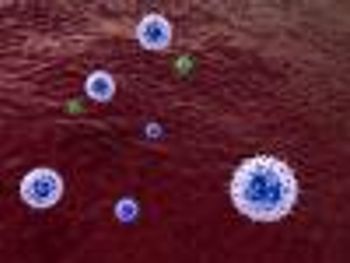
Researchers explore alternate treatment for chronic lymphocytic leukemia.

Researchers explore alternate treatment for chronic lymphocytic leukemia.

Top news of the week in cancer drug development.

A majority of bowel cancers could be classified into four major categories defined by the researchers.

Global AML market forecast to reach nearly a billion dollars by 2024.

Ibrutinib is significantly more effective than chlorambucil in chronic lymphocytic leukemia.

Researchers evaluate association between psoriasis and cancer.

Experimental tyrosine kinase inhibitor targets T790M mutation-positive non-small cell lung cancer.

Colon cancer in African Americans associated with more aggressive clinical behavior.

Although smoking is a well-known risk factor for lung cancer, the results of a recent study indicate that smokers with chronic obstructive pulmonary disease (COPD) face a significantly higher risk of developing lung cancer than smokers without the respiratory condition.

Latest developments in oncology drug research.

Revenue not expected to maintain pace of current immunology treatments.

Submission bolstered by trials evaluating biosimilar candidate in moderate-to-severe plaque psoriasis and rheumatoid arthritis.

Researchers evaluate link between hemoglobin and morbidity in patients who undergo major gastrointestinal surgery.

Severity and type of symptoms varies among cancer patients in different age groups.

Continued steroid use associated with worse anxiety, sleep, and fatigue.

Out-of-pocket costs to remain a significant hurdle for patients even after closing of coverage gap.

Vistogard treats patients who develop life-threatening toxicities within days of receiving cancer drugs.

Fatigue had a strong association with pain intensity and interference in inflammatory bowel disease.

Bendeka was approved for indolent B-cell non-Hodgkin lymphoma that progressed during or within 6 months of treatment with a rituximab regimen.

Eating before bed can have a significant impact on the development of nonalcoholic fatty liver disease.

New treatment option for patients who no longer respond to Xalkori.

An understanding of biosimilars will be essential for patient consults and education.

Treatment shows clinically meaningful reduction in the number of cancer cells in patients with relapsed or refractory chronic lymphocytic leukemia.

Overall survival rate nearly doubles in patients who used aspirin post-diagnosis.

Addition of midostaurin to chemotherapy shows promise in patients with AML.

Scientists discover threat from AAV2 virus and from correlation to the development of liver cancer.

Anemia caused by chemotherapy for lymphoid malignancies improved in patients with non-Hodgkin's lymphoma and multiple myeloma.

Pollutants may accelerate fibrosis, metabolic disease, and liver cancer.

Treatment with bevacizumab and lomustine not found to offer a survival advantage.